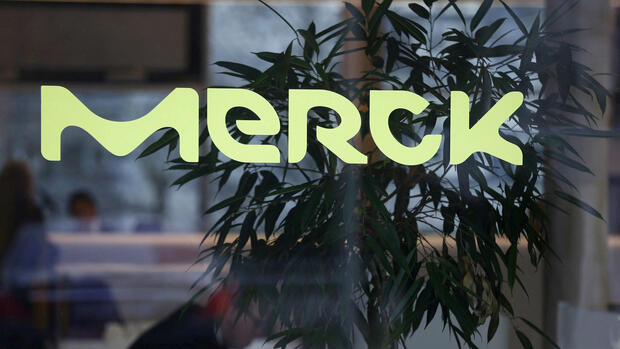The group is making progress on the sale of its pigments business,
(Photo: Reuters)
Frankfurt, Dusseldorf The sale of the pigments business of the German chemical and pharmaceutical giant Merck is on the home stretch. According to financial circles, the Dax group received three final offers in mid-June.
US firm Vibrantz Technologies, owned by private equity firm American Securities, also bid, along with chemical-sector veteran venture capital firm Lone Star and Chinese competitor Chesir, according to several people familiar with the matter. The bids are around 750 to over 850 million euros, it said, with the Chesir bid being the highest.
The Darmstadt-based company is now faced with the question of whether they want to hand over the business with the dyes, which are used in car paints or cosmetic products, to Chinese hands. It is also unclear whether the management around CEO Belén Garijo does not want to examine other options, since the original price expectations of almost one billion euros were not met. A decision is expected shortly.
Merck and the bidders did not want to comment on the information or were initially unavailable.
Sales by German companies to Chinese buyers have recently been viewed very critically by the public and politicians. The federal government prevented the sale of one of two semiconductor companies to buyers from the People’s Republic and made sure that the Chinese Cosco group was only able to buy a smaller share in a Hamburg port terminal than originally planned.
Critics fear relocation of production
Pigments such as those from Merck do not belong to critical infrastructure or to sectors such as chip technology that are considered worthy of protection. Critics see some problems, however. In the long term, for example, the Chinese owners could exclusively offer new paint developments to Chinese car manufacturers.
revenue generator
439
Million Euros
Merck acquired in 2022 with the pigment business.
It is also to be feared that production could be relocated to China. Merck’s largest production plant for pigments is in Gernsheim in southern Hesse – 600 of the 1,400 employees worldwide worked there most recently.
The example of Allgaier recently showed that things don’t always go smoothly with Chinese owners. The auto parts supplier filed for bankruptcy a year after it was taken over by the Chinese company Westron. Just this week, the Office for the Protection of the Constitution issued a clearer warning than ever before of the dangers posed to German companies by Chinese espionage. The Federal Ministry of Economics initially did not want to comment on the Merck case.
With the sale of the pigments business, which had sales of 439 million euros and an operating result (Ebitda) of 93 million euros in 2022, Merck intends to free up resources for investments in its pharmaceutical and electronics activities. The company also wants to make acquisitions again this year – the deal should also bring in money for this.
More than a year ago, Merck hived off the pigments division and initiated sales preparations.
The Merck boss is realigning the Dax group.
(Photo: dpa)
The industry is on the move as large chemical groups increasingly seek to divest from areas with weaker margins and weaker growth rates. The focus is on the more profitable specialty chemicals.
In 2019, BASF sold its pigments business to the Japanese chemical company DIC for €1.15 billion. Last summer, the Swiss company Clariant sold its pigment business for 855 million francs. The buyer was a consortium made up of the German competitor Heubach Group and the financial investor SK Capital Partners.
Pigment business no longer fits into Merck’s strategy
According to financial circles, Heubach was also interested in the Merck pigments business, but was not included in the second round of bidding, nor was the German specialty chemicals group Altana. With its Eckart division, the Wesel-based company is a leading manufacturer of special and effect pigments and could have doubled its business in this area with the takeover. However, Altana was not interested in the entire pigment portfolio and offered a price that was too low.
At Merck, the division fitted less and less with the rest of the specialty chemicals activities. After a series of acquisitions, they are now concentrating very heavily on display and semiconductor materials. In 2022, the pigments sector accounted for only eleven percent of sales in the electronics sector, which in turn contributed the smallest part to the entire Merck business at 17 percent.
In 2021, as part of its “Level Up Program”, Merck announced that it would invest more than three billion euros in the electronics business by 2025. At the same time, Merck boss Garijo is in the process of further expanding the life science and pharmaceutical activities, has made acquisitions in this area and intends to continue investing heavily there.
More: Merck is broad-based – “Diversification is an absolute strength”
